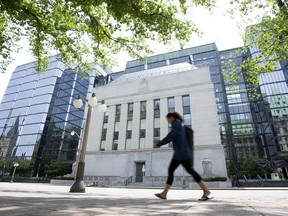Despite leading in debt accumulation, Canada lagged behind a majority of peers on key economic indicators

Article content
During the pandemic, countries around the world accumulated significant debt in an effort to support their economies. In Canada, programs such as the Canada Emergency Wage Subsidy (CEWS) and Canada Emergency Response Benefit (CERB) cost hundreds of billions of dollars. Canada was second only to Japan among industrialized countries in the scale of our government borrowing during the pandemic. Yet all that borrowing didn’t translate into stronger economic performance compared to our peers.
Advertisement 2
Article content
Even before COVID, Canada’s gross debt position (a measure of total government indebtedness) relative to the size of the economy wasn’t great. In 2019, according to the International Monetary Fund (IMF), Canada had the 10th-highest gross debt as a share of GDP (87.2 per cent) among 33 industrialized countries. By 2021, that number was up to 112.1 per cent, an increase of 24.9 percentage points, the second-largest increase in gross debt as a share of the economy among the 33 countries — again, behind only Japan.
What does that mean for Canadians?
Given the big increase in our debt, many observers believed Canada’s economy would fare better than others. Unfortunately, the data do not bear that out. As noted in a new study published by the Fraser Institute, in 2020 and 2021 Canada underperformed relative to our peers in both economic growth and unemployment.
Advertisement 3
Article content
For the overall economy, Canada ranked 21st out of 33 countries, averaging negative 0.3 per cent GDP growth (inflation-adjusted) in 2020 and 2021. In other words, nearly two-thirds of our peer group —including the United States and Australia — fared better than Canada. Ireland, which actually reduced its gross debt-to-GDP ratio between 2019 and 2021, led the 33 countries in inflation-adjusted GDP growth.
Our performance on unemployment was even worse over the same two years. Of the 33 countries, Canada had the fifth-highest average unemployment rate in 2020 and 2021, behind only Greece, Spain, Italy and Sweden. (The IMF data are standardized to allow for inter-country comparisons.)
Advertisement 4
Article content
Put simply, despite leading in debt accumulation, Canada lagged behind a majority of our peers on key economic indicators. And debt accumulation comes with consequences. All else equal, higher debt means more tax dollars go towards paying debt interest, leaving less money for health care, social services and/or tax relief. Interest payments on federal debt alone will cost Canadian taxpayers approximately $180 billion through fiscal year 2026-27, and this assumes lower interest rates than will likely exist, given the Bank of Canada’s declared intention to bring inflation to heel. As interest rates rise, government debt interest costs also rise, all else equal.
Debt accumulation can also cause, not just complicate, inflation. When the central bank purchases government debt to finance spending, as it did in Canada during the pandemic, prices in general to rise.
Instead of delivering the superior growth and employment performance that many people hoped from it, massive debt accumulation during the pandemic simply put more costs on Canadians.
Tegan Hill and Milagros Palacios are economists with the Fraser Institute.
Advertisement
Opinion: Canada’s economy: over-indebted and underperforming - Financial Post
Read More



No comments:
Post a Comment